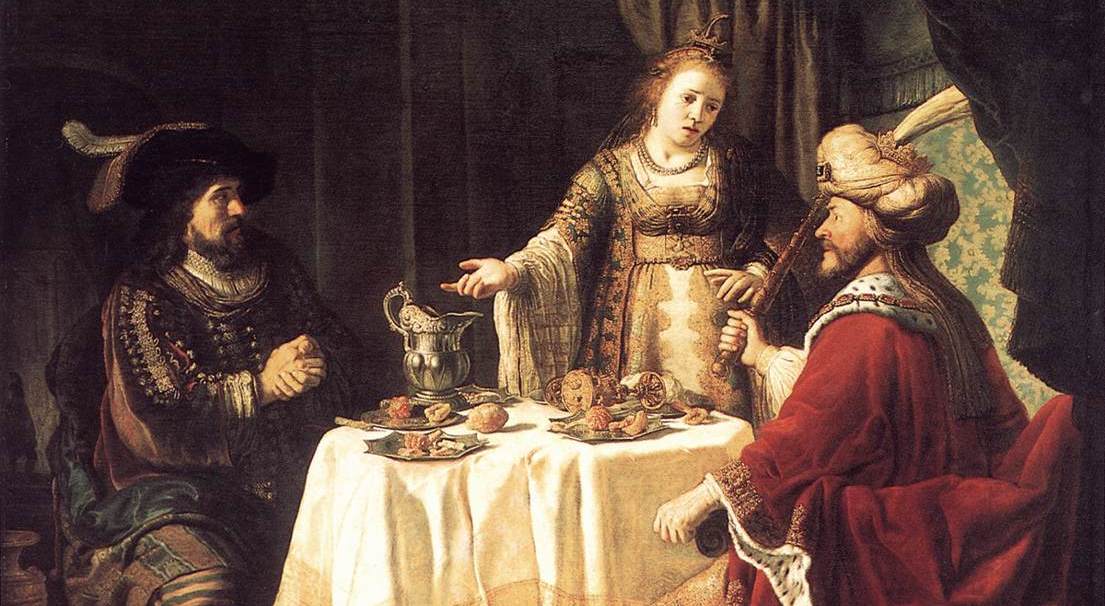The Book of Esther — with its soapy plot twists, reversal of fortunes, joy-filled-feasts and sorrow-filled-fasts — is not one that I spent too much time unpacking during the course of my Hebrew school education. Sure, I appreciated the Purim carnival, that one Sunday a year when I could dress up like royalty and toss beanbags and consume hamantaschen.
Turns out I had been missing out on much more.
Esther, which is read from the megillah (scroll) on Purim, is one of only two books in the Torah (Song of Songs being the other) in which God is not mentioned. Our heroine answers the call to save Persian Jews from annihilation, completely unprompted by God’s voice in a burning bush or at the peak of a mountain or anywhere else. Her ability to act here is the ultimate testament to faith and a reminder of our essential power for human agency.
Esther’s cousin, and surrogate father, Mordecai, suggests that she is the exact person necessary to avert the evil decree of Haman, and to save the Jewish people:
With your help, My Jewish Learning can provide endless opportunities for learning, connection and discovery.
Do not imagine that you of all the Jews will escape with your life by being in the king’s palace. On the contrary, if you keep silent in this crisis, relief and deliverance will come to the Jews from another quarter, while you and your father’s house will perish. And who knows, perhaps you have attained to royal position for just such a crisis. (Esther 4:13)
Esther does not for a moment pause, responding:
Go assemble all the Jews who live in Shushan, and fast in my behalf; do not eat or drink for three days, night or day. I and my maidens will observe the same fast. Then I shall go to the king, though it is contrary to the law; and if I perish, I shall perish. (Esther: 4:16)
I remember, vividly, the first time I was called on to explain this holiday to a non-Jewish friend. We were in a beer line at a Purim party our senior year at Oberlin College. With the Destiny’s Child hit song “Say My Name” playing on the stereo — it was 2000, after all — I did my best to summarize the Purim story. My friend seemed satisfied with the limited explanation that Purim was yet another example of the Jewish people overcoming a plot to destroy them, and that this instance was particularly special because it starred a girl hero. And also, there were cookies involved.
There was a poster on the wall from our college brochure: A picture of the earth with the words: “Think One Person Can Change the World? So Do We.”
At 18, I believed this, fully and idealistically, that I held a unique destiny — that as a young woman I was poised to change the world. I came of age in a small rural community, where my brother and I were two of a handful of Jews at our high school. When a classmate had admitted she’d never heard of the Holocaust, I gave a talk to the whole school on the importance of remembrance and the concept of Never Again. Soon after an annual trip the Holocaust Museum in Washington, D.C., was added to the curriculum. It was a kind-hearted and open community where I witnessed the power of my own voice.
At 28, when the rabbi who performed my wedding ceremony gave me a charge to act as “a pillar against the chaos that threatens to engulf us all,” I had seen enough of the world to recognize that this was going to be a challenge.
And, now, at 38, I find myself longing to encounter a burning bush, something — anything — obvious and explicit to instruct me towards fulfilling my destiny, to do what is necessary of me in this world. I’ll find myself at an impasse and want a grand gesture that directs me towards what I am supposed to do next. The world’s troubles feel so vast. Can one person change them?
The circumstances outlined in the Purim story — the threat of genocide and destruction — are, of course, not limited to ancient times. And it’s easy to succumb to a sense of powerlessness, of being completely overwhelmed and not knowing where to begin. To think that beginning wouldn’t even matter. So it feels good — it feels necessary — to be reminded of Esther’s bravery, and of her human actions fueled by faith in a story where God is concealed. And, also, it is good to be reminded of the person who was attracted to that college brochure in the first place.
I am not a queen. I am no longer a young girl. But I am a person of faith. Someone who fasts and prays. And someone who believes in that human action, in our agency to change the world.
Rebbetzin, mother and writer, Alana Joblin Ain, earned her BA from Oberlin College and an MFA in poetry from Hunter College, where she has also taught creative writing and literature. Alana lives in Brooklyn with her husband, Rabbi Dan Ain, and their two children. They are the founders of Because Jewish.
Purim
Pronounced: PUR-im, the Feast of Lots, Origin: Hebrew, a joyous holiday that recounts the saving of the Jews from a threatened massacre during the Persian period.
Torah
Pronunced: TORE-uh, Origin: Hebrew, the Five Books of Moses.



